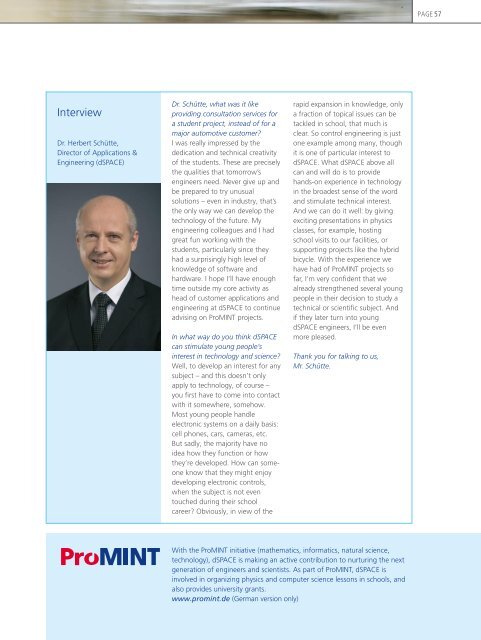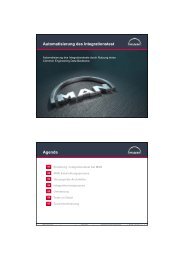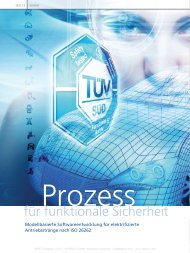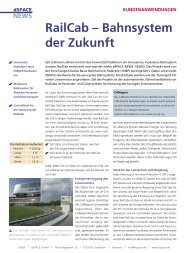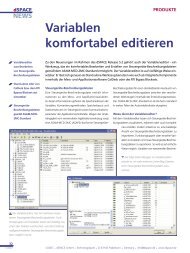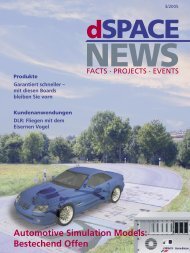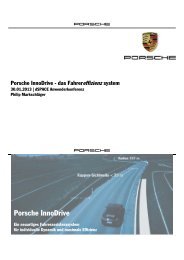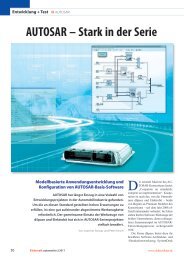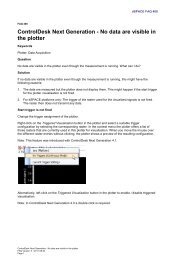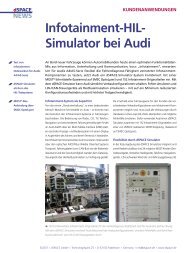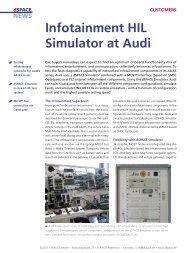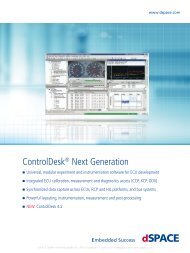magazinE - dSPACE
magazinE - dSPACE
magazinE - dSPACE
Create successful ePaper yourself
Turn your PDF publications into a flip-book with our unique Google optimized e-Paper software.
Interview<br />
Dr. Herbert Schütte,<br />
Director of Applications &<br />
Engineering (<strong>dSPACE</strong>)<br />
Dr. Schütte, what was it like<br />
providing consultation services for<br />
a student project, instead of for a<br />
major automotive customer?<br />
I was really impressed by the<br />
dedication and technical creativity<br />
of the students. These are precisely<br />
the qualities that tomorrow’s<br />
engineers need. Never give up and<br />
be prepared to try unusual<br />
solutions – even in industry, that’s<br />
the only way we can develop the<br />
technology of the future. My<br />
engineering colleagues and I had<br />
great fun working with the<br />
students, particularly since they<br />
had a surprisingly high level of<br />
knowledge of software and<br />
hardware. I hope I’ll have enough<br />
time outside my core activity as<br />
head of customer applications and<br />
engineering at <strong>dSPACE</strong> to continue<br />
advising on ProMINT projects.<br />
In what way do you think <strong>dSPACE</strong><br />
can stimulate young people’s<br />
interest in technology and science?<br />
Well, to develop an interest for any<br />
subject – and this doesn’t only<br />
apply to technology, of course –<br />
you first have to come into contact<br />
with it somewhere, somehow.<br />
Most young people handle<br />
electronic systems on a daily basis:<br />
cell phones, cars, cameras, etc.<br />
But sadly, the majority have no<br />
idea how they function or how<br />
they’re developed. How can someone<br />
know that they might enjoy<br />
developing electronic controls,<br />
when the subject is not even<br />
touched during their school<br />
career? Obviously, in view of the<br />
rapid expansion in knowledge, only<br />
a fraction of topical issues can be<br />
tackled in school, that much is<br />
clear. So control engineering is just<br />
one example among many, though<br />
it is one of particular interest to<br />
<strong>dSPACE</strong>. What <strong>dSPACE</strong> above all<br />
can and will do is to provide<br />
handson experience in technology<br />
in the broadest sense of the word<br />
and stimulate technical interest.<br />
And we can do it well: by giving<br />
exciting presentations in physics<br />
classes, for example, hosting<br />
school visits to our facilities, or<br />
supporting projects like the hybrid<br />
bicycle. With the experience we<br />
have had of ProMINT projects so<br />
far, I’m very confident that we<br />
already strengthened several young<br />
people in their decision to study a<br />
technical or scientific subject. And<br />
if they later turn into young<br />
<strong>dSPACE</strong> engineers, I’ll be even<br />
more pleased.<br />
Thank you for talking to us,<br />
Mr. Schütte.<br />
With the ProMINT initiative (mathematics, informatics, natural science,<br />
technology), <strong>dSPACE</strong> is making an active contribution to nurturing the next<br />
generation of engineers and scientists. As part of ProMINT, <strong>dSPACE</strong> is<br />
involved in organizing physics and computer science lessons in schools, and<br />
also provides university grants.<br />
www.promint.de (German version only)<br />
pAGe 57


